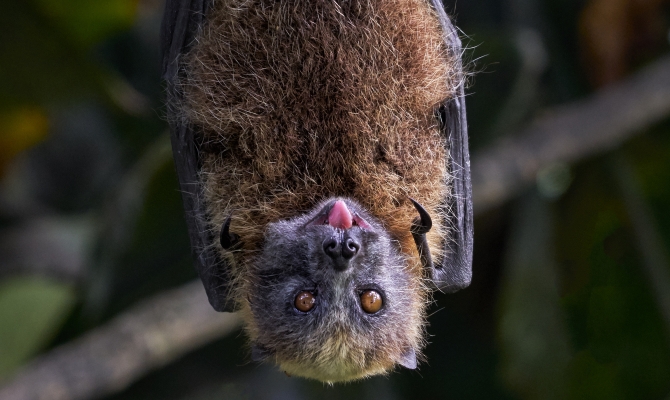
The first Pacific Islands Bat Forum opened virtually yesterday, bringing together bat conservationists and key stakeholders from across the Pacific region.
The Pacific Islands Bat Forum is led by the Australasian Bat Society in collaboration with the Secretariat of the Pacific Regional Environment Programme (SPREP) and other regional partners. The aim of the forum is to facilitate the sharing of knowledge between community organisations, researchers, and policymakers, and to provide a collaborative environment to identify conservation and research priorities for Oceania bats.
Tropical bats like the fruit bats found in the Pacific, are essential to our rainforests, where they pollinate flowers and disperse seeds. Many Pacific agricultural plants such as bananas, mangoes and avocadoes rely on bats for pollination, and without bats humans around the world, not just in the Pacific, would not be able to enjoy many fruits.
Insectivorous bats also help control the spread of viruses through the large number of mosquitoes and insects they ingest.
Mr Stuart Chape, Director of Island and Ocean Ecosystems Programme at SPREP, opened the forum with a keynote address, providing a brief overview of the importance of bats for Pacific island ecosystems and culture.
“Bats are keystone species that play vital ecological roles, including pollination, and contribute to maintaining diversity, survival of plant species and retaining ecosystem resilience in the Pacific islands,” said Mr Chape.
“The Pacific is home to a high diversity of bat species with 132 bats found in 15 Pacific countries and territories. Around 27 per cent of these are endemic to the islands in this region, and forty bat species are known to be hunted at alarming rates making the Pacific the region with the highest proportion of bats hunted globally.”
Other threats to bats include habitat loss, invasive species, cyclones and climate change, which have resulted in population declines of Pacific bat species, with some now listed as threatened on the International Union for Conservation of Nature Red List.
The ‘State Of Environment And Conservation In The Pacific Islands: 2020 Regional Report’ produced by SPREP assesses the trends and status of endorsed regional environment indicators, one of which is terrestrial wildlife protection that includes the status of bats. While data exists, the population trends of bats remain unknown, supporting the need for more research to gather data on bats across national and regional levels in the Pacific.
For the successful conservation of Pacific bat species to occur, Mr Chape highlighted the need for communities and governments to become more involved in actively protecting Pacific bats. Some key steps he stated, should include increasing public awareness and research, empowering communities with knowledge of bats’ important ecological roles, formally protecting bats through legislation and enforcement, and the establishment of protected areas.
The Pacific Islands Bat Forum will continue through to the end of the week, held virtually from 10 – 14 August 2021. It is a free online event open to the public and can be accessed individually through the platform Whova, or through one of the "Local Hubs" hosted in several Pacific island countries and territories.
These hubs are open to registered forum participants to help promote discussion around bat conservation and to increase accessibility to the forum. The Apia Hub, hosted by SPREP, is located at the Pacific Climate Change Centre at SPREP’s campus in Vailima.
The forum will bring together a diversity of participants, from governments, non-government organisations, scientists, academic institutes, community groups and bat experts to share knowledge, identify gaps, challenges, and discuss priorities and opportunities.
For more information or enquiry regarding the Bat Forum or how to join the Apia Hub, please contact Ms Juney Ward, Ecosystem and Biodiversity Officer [email protected] or Ms Karen Baird, Threatened and Migratory Species Adviser [email protected].